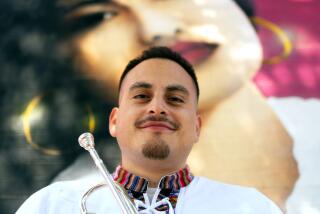Aural histories, the next gen
- Share via
It might seem sheer folly for young artists to make new recordings of well-known concertos. They are competing with the great soloists of the past 100 years in a marketplace glutted with standard repertory. Vivaldi’s “Four Seasons,” to take but one example, has been recorded more than 200 times. Still, we count on each new crop of musicians to keep music alive.
*
Bach: Works for Trumpet
Alison Balsom (EMI)
* * *
PURISTS may balk at the idea, not to mention the very title, of this album, considering that the Baroque master rarely wrote for solo trumpet. Then again, purism can be a slippery slope in the world of Bach, whose instrumental intentions were sometimes vague and whose keyboard music has gained considerable cachet over the last century on that post-Baroque tool, the grand piano. But British trumpeter Balsom’s brilliant experiment succeeds precisely because it sounds so preternatural and organic -- anything but experimental.
Bach’s writing has undergone radical rewiring here but survives beautifully, as in the Trio Sonata in C, BWV 529. Originally an organ sonata, it has been separated into a crisp, clarion lead voice for trumpet intertwined with a secondary part for violin and continuo. The Concerto in C minor, BWV 974 (after Marcello), here a duet with organ, finds the oboe protagonist swapped out for Balsom’s trumpet; it gains sonic weight without losing ornamental flair and fleetness of line. With this music, Balsom manages the paradoxical feat of both showing deep reverence for Bach and gamely exploding conventional wisdom surrounding his oeuvre.
-- Josef Woodard
More to Read
The biggest entertainment stories
Get our big stories about Hollywood, film, television, music, arts, culture and more right in your inbox as soon as they publish.
You may occasionally receive promotional content from the Los Angeles Times.








